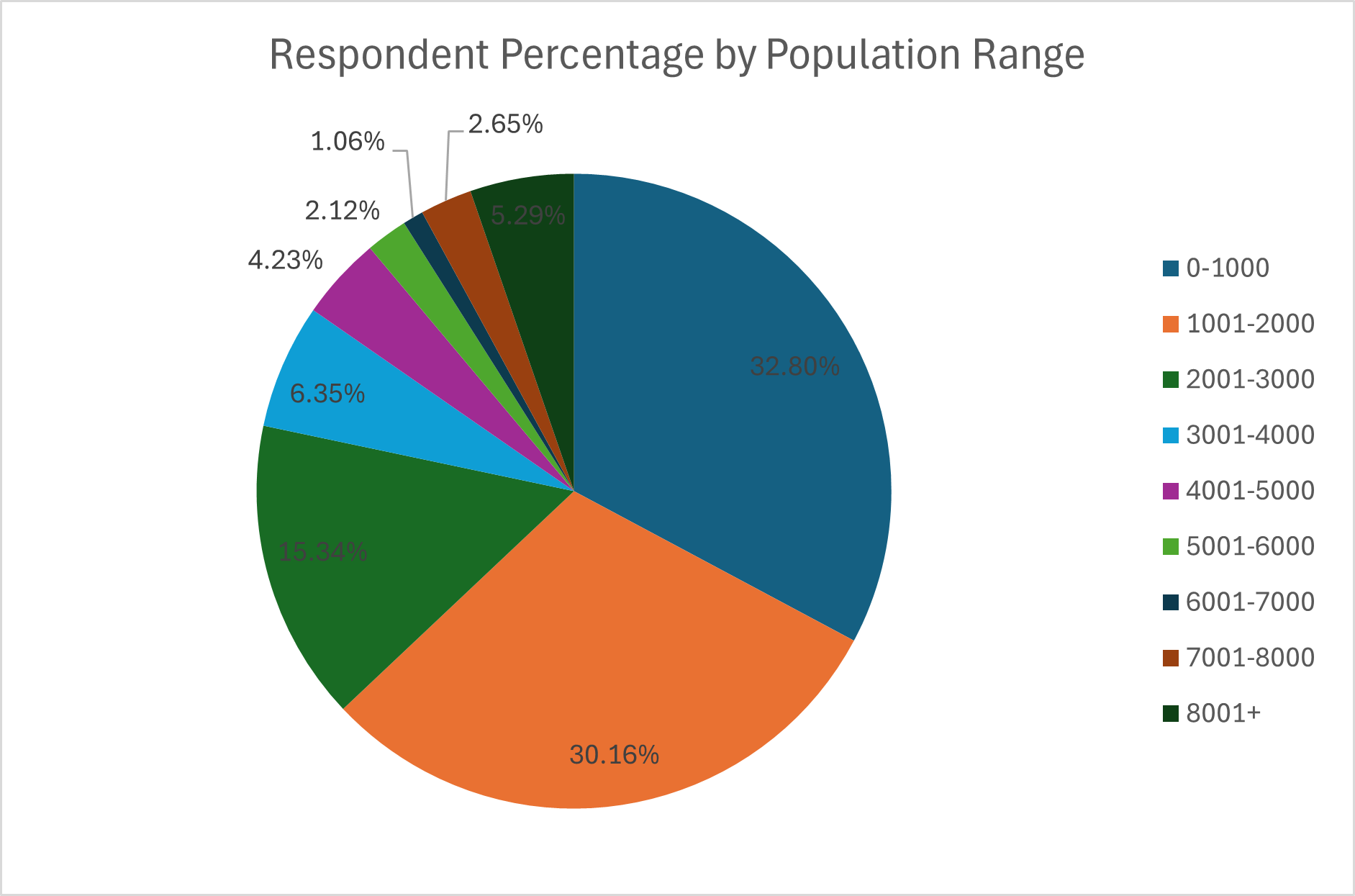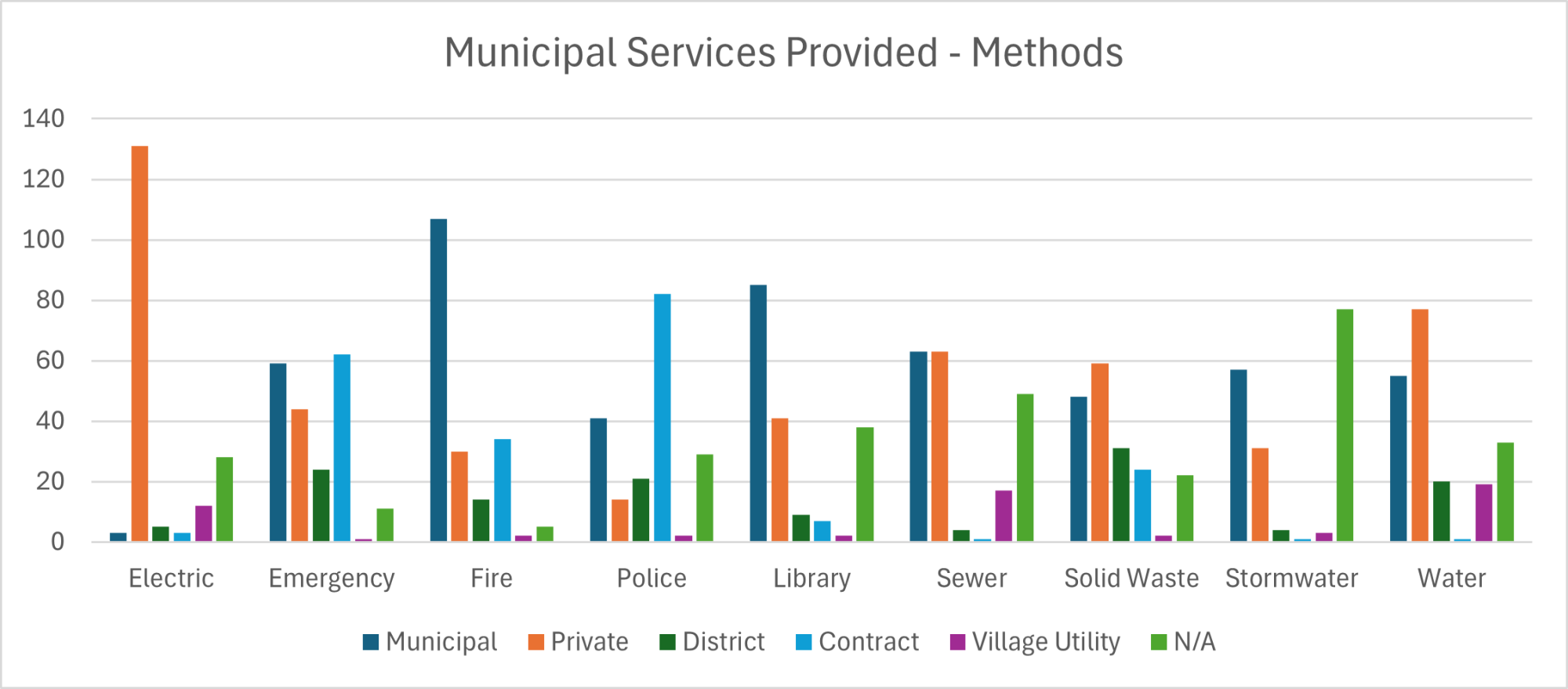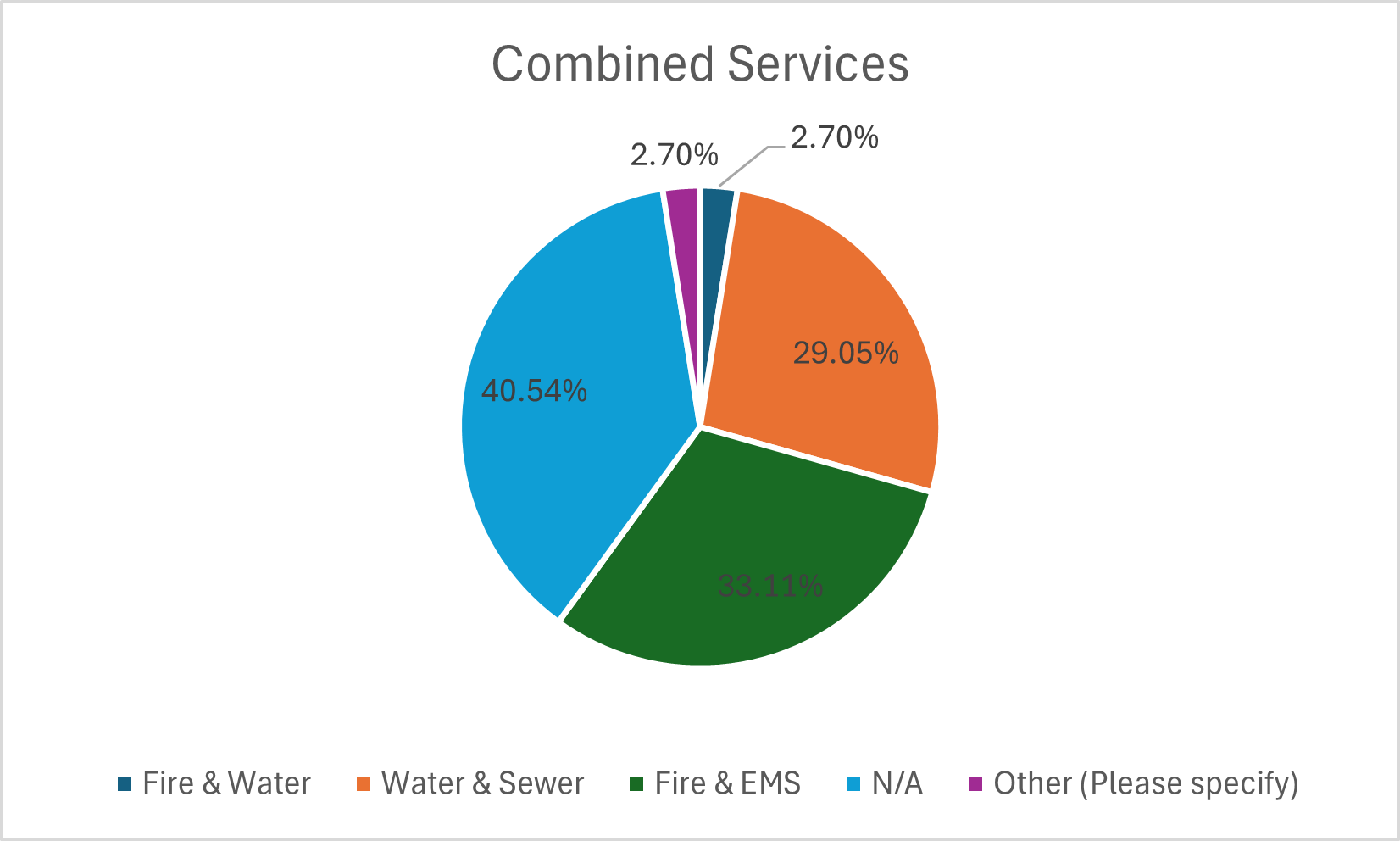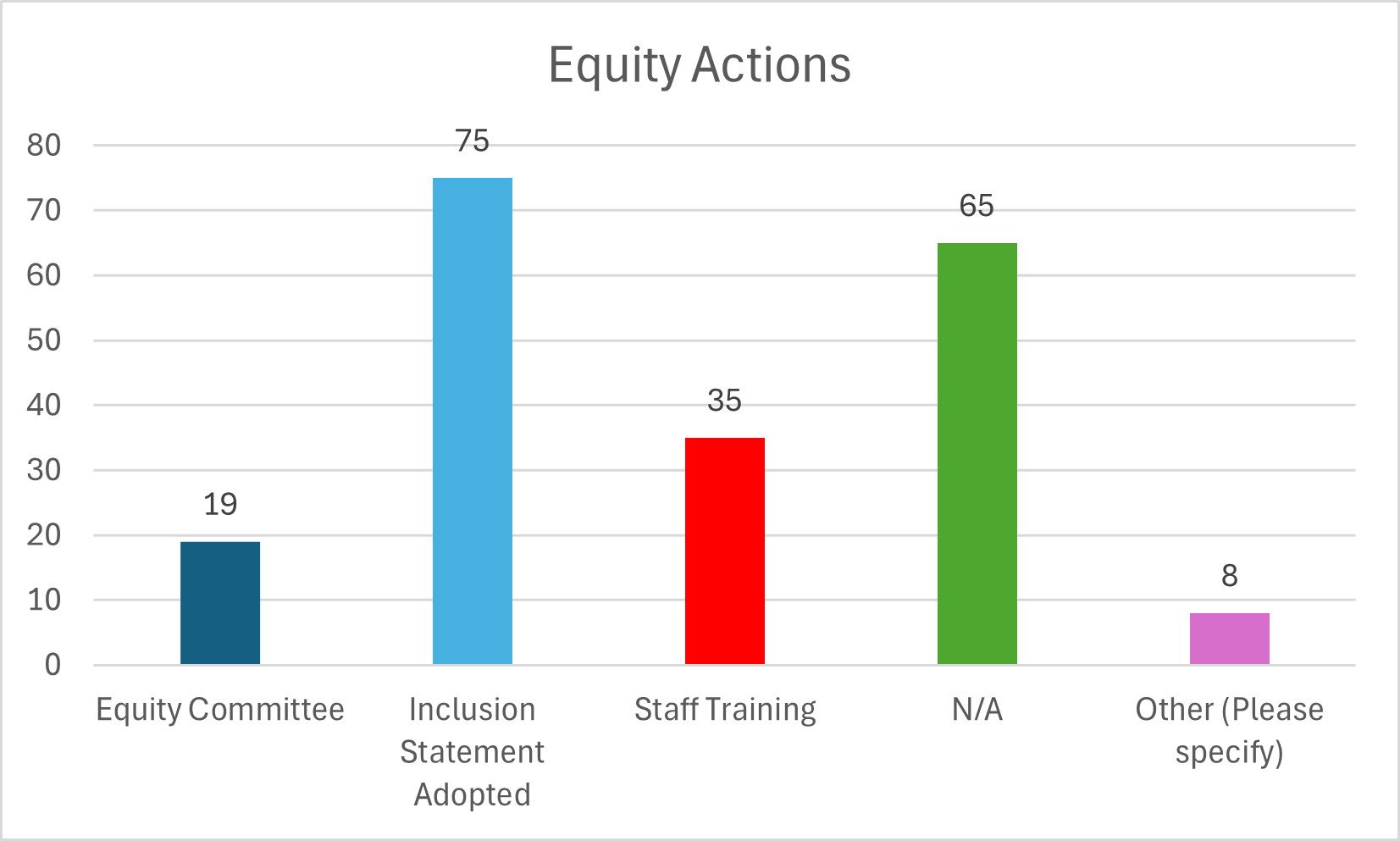MAC
Highlights of Data in the 2024 Compensation and Benefits Report
The Vermont League of Cities and Towns (VLCT) has been collecting compensation and benefits information from its member towns, cities, and villages every year since the organization was formed in 1968. In 2024 we received 189 responses, surpassing the number of responses to our 2023 survey for our highest response rate ever. We hope more of you will complete the survey every summer and that all municipalities will use the ensuing reports to assess their pay rates, develop their budgets, and compare budgets and benefits with similar communities.
Survey Goals
Our goal for the survey is to provide hard-to-find contextual and comparison data in a format that’s easy to use and understand.
In the last several years we have radically redesigned the survey so VLCT members can contribute their data easily and quickly. These improvements include moving from a manual process to an online survey platform, working with NEMRC to incorporate automated reports for their users, extending the time for responding, reformulating questions to reduce the size of the survey, creating incentives to participate (i.e., giving a new iPad to one randomly selected responding municipality), and incorporating more contextual data (such as hiring and termination dates) to help communities compare positions more accurately. We hope that these changes increase not only the number of members that respond but also the usefulness of the resulting data, which participants receive free of charge both as a structured report and as a manipulable Excel file. This year we reduced the overall size of the survey and have made the resulting data available for download via the Municipal Access Portal at vlct.org. If your municipality hasn’t participated in the last few years, we encourage you to complete the next year.
The Data
We collect a wide range of data related to municipal compensation and benefits. Sections include:
- Municipal services and property information
- Municipal offices’ election methods and eliminations
- Payroll data for more than 50 position types (officials and staff)
- Insurance and retirement benefits (costs, plans, etc.
Education and fringe benefits
Below you’ll find a few highlights from this year’s report that we think might interest you. Notice that some survey respondents skipped some questions.
Population of Responding Municipalities
While the 189 municipalities that responded to our 2024 survey range widely in population, the majority are at the smaller end of the range.

Range | Count | Percentage |
|---|---|---|
0-1000 | 62 | 32.80% |
1001-2000 | 57 | 30.16% |
2001-3000 | 29 | 15.34% |
3001-4000 | 12 | 6.35% |
4001-5000 | 8 | 4.23% |
5001-6000 | 4 | 2.12% |
6001-7000 | 2 | 1.06% |
7001-8000 | 5 | 2.65% |
8001+ | 10 | 5.29% |
Total | 189 | 100% |
Municipal Services
We ask municipalities each year how they provide various services to their communities with an eye toward how they balance the need for cost savings with the needs and priorities of their citizens. The table below shows the means by which survey responders provide municipal services, and the one below it shows which services tend to be combined within municipalities.

| Municipal | Private | District | Contract | Village Utility | N/A | ||||||
| Percent | Count | Percent | Count | Percent | Count | Percent | Count | Percent | Count | Percent | Count |
Electric | 1.68% | 3 | 73.18% | 131 | 2.79% | 5 | 1.68% | 3 | 6.70% | 12 | 15.64% | 28 |
Emergency | 33.15% | 59 | 24.72% | 44 | 13.48% | 24 | 34.83% | 62 | 0.56% | 1 | 6.18% | 11 |
Fire | 58.79% | 107 | 16.48% | 30 | 7.69% | 14 | 18.68% | 34 | 1.10% | 2 | 2.75% | 5 |
Police | 22.65% | 41 | 7.73% | 14 | 11.60% | 21 | 45.30% | 82 | 1.10% | 2 | 16.02% | 29 |
Library | 47.75% | 85 | 23.03% | 41 | 5.06% | 9 | 3.93% | 7 | 1.12% | 2 | 21.35% | 38 |
Sewer | 34.43% | 63 | 34.43% | 63 | 2.19% | 4 | 0.55% | 1 | 9.29% | 17 | 26.78% | 49 |
Solid Waste | 27.43% | 48 | 33.71% | 59 | 17.71% | 31 | 13.71% | 24 | 1.14% | 2 | 12.57% | 22 |
Stormwater | 34.55% | 57 | 18.79% | 31 | 2.42% | 4 | 0.61% | 1 | 1.82% | 3 | 46.67% | 77 |
Water | 30.05% | 55 | 42.08% | 77 | 10.93% | 20 | 0.55% | 1 | 10.38% | 19 | 18.03% | 33 |

Combined Services | Percent | Count |
Fire & Water | 2.70% | 4 |
Water & Sewer | 29.05% | 43 |
Fire & EMS | 33.11% | 49 |
N/A | 40.54% | 60 |
Other (Please specify) | 2.70% | 4 |
Justice, Diversity, Equity, Inclusion, & Belonging (JDEIB)
Despite an overall reduction in the number of survey questions, we added a few human resources and equity related questions to this year’s survey. We found that many municipalities have committed themselves to enhancing justice, equity, diversity, inclusion, and belonging efforts in their communities whether through the adoption of inclusion statements, the formation of equity related committees, training, policies, or other means.

Equity Actions | Percent | Count |
Equity Committee | 12.03% | 19 |
Inclusion Statement Adopted | 47.47% | 75 |
Staff Training | 22.15% | 35 |
N/A | 41.14% | 65 |
Other (Please specify) | 5.06% | 8 |
If you are interested in learning more about JDEIB, how VLCT and other municipalities are working toward more equitable communities, and ways that your municipality can expand its own equity efforts, refer to our Justice, Diversity, Equity, Inclusion & Belonging Resources page.
Report Access
Responding members automatically receive, free of charge, access to the digital data along with one bound print of the survey report, and they can purchase an additional bound print at vlct.org/store (after checking the drop-down list to confirm that their municipality responded). The same online page allows VLCT members that didn’t take the survey to purchase a digital + printed set at a lower price than non-members can.
If your municipality either took the survey or purchased the report, you are welcome to share it with other staff and officers within your local government, but please do not distribute the report to the public or others not employed by the municipality.
Tax Abatement FAQs
Attend Town Fair to Get Maximum Value from Your Membership
If you’re reading this, you’re likely a member of VLCT. You’re one of more than 5,000 elected, appointed, or employed municipal officials here in Vermont. One of your greatest membership benefits is the VLCT connection to people facing similar challenges, similar opportunities, and similar head-slapping moments in the town office. You’re not alone, you don’t need to have the answer to every question, and there are people interested in your success. Come meet them at Town Fair 2024 in Killington on October 2nd.
This year’s theme, “Making Connections and Sharing Solutions”, emphasizes the importance of coming together. Being in the same room with several hundred other selectboard members, top-level managers, clerks, treasurers, listers, mayors, and other colleagues is the best part of Town Fair. And let’s not forget the fun – from this year’s silent auction, to a packed exhibit hall, to an ice cream social and the grand raffle. The committee also put together some deep content in five different workshop tracks: Finance, Administration and Operations; Leadership; Building Safe and Healthy Communities; Elections; and the fifth track – which aims to create more space for networking, discussion, and dialogue – Facilitated Discussions.
Facilitated Discussions
At the suggestion of our Town Fair Planning Committee, we created an entire track that aims to create space to talk about what you want to talk about, not what VLCT thinks you should talk about. One of our board members likened this track to an “un-conference”. These loosely structured and lightly facilitated sessions will bring people together around a common topic for conversation. I’m personally most excited about our young municipal leaders session. What’s “young”, you ask? I don’t know for sure, but if you have to ask, you might not be young. We also have a new session focused on what different municipal officers do and a session dedicated to simply asking any question you want of VLCT lawyers or other municipal officials. It’s an experiment that I hope you’ll sign up to participate in.
You don’t need to worry about which workshops are in which tracks. Bounce between tracks, sample a session from each, and follow your interests.
Finance, Administration, and Operations
Some of the most popular content at Town Fair has always been the most practical. Designed to appeal to those in the town office every day – such as clerks, treasurers, listers, department heads, administrators, and managers – this track may also appeal to members of legislative bodies. This year you’ll find sessions aimed at helping you engage residents better, introducing you to the new procurement portal “VTBuys”, updating you on new property tax system changes, and helping you recruit and retain good people.
Leadership
In order to lead, municipal officials need a big-picture understanding of what’s happening throughout the state, how state policy changes could affect their communities, and what tools exist to help catalyze change in their communities. That’s why we’ve created sessions for this track about equity in land use, workplace culture, and one of the largest leadership challenges we’ve recently seen in municipal government: how leaders in Pawlet handled the Slate Ridge dispute. This track is intended for members of municipal legislative bodies, mayors, and managers, but anyone with an interest in these topics is encouraged to attend.
Building Safe and Healthy Communities
Designed to inspire and educate land use officials, mayors, selectboards, city councils, village trustees, and anyone who wants to use municipal authorities to improve the livability of their communities, this track features legislative updates, tips for good governance practices, and more. We included a session on the newly passed housing and land use bill that significantly affects Act 250 and municipal zoning, a session on civility and effective meeting management, and a session on cyber security (there’s money coming to help you tackle this issue).
Elections
Clerks! Clerks! Clerks! Featuring appearances from our Secretary of State’s office as well as our former elections director Will Senning (now a big wig with the federal office that oversees election security), this track is singular in focus: helping clerks prepare for this year’s election. VLCT couldn’t have offered this track without the help of the Vermont Municipal Clerks’ & Treasurers’ Association.
Here's the best part of the workshop tracks being offered at Town Fair this year: you don’t need to worry about which workshops are in which tracks if you don’t want to. Bounce between tracks, sample a session from each, and follow your interests.
But Wait, There’s More!
My favorite part of Town Fair is presenting the annual municipal service awards – the Lifetime Achievement Award, the Municipal Service Award, and the Legislative Service Award. We’ll do that at lunch this year – where we’ll also hear from VTDigger CEO Sky Barsch about how the media and local government depend on each other. It’s not too late to nominate someone for a VLCT Municipal Service Award.
Finally, to use your time as efficiently as possible, Town Fair 2024 is a densely packed one-day event. Register by August 31 to get the early bird price of just $79 for the entire day, which includes breakfast roundtables, lunch, and the ice cream social in addition to all the great sessions, exhibitors, and raffle prizes. To provide all that in one day, we will hold the annual meetings for VLCT, PACIF, and VERB in a hybrid fashion the day before, on October 1. It’s free to attend the annual meeting and critically important that every member has a representative there. Attend from your desk, your kitchen table, or your car (safely parked, of course). Our member-owned insurance trusts need your input. We’ll be voting on a new municipal policy to guide our work in the legislature next biennium. And we’ll be electing members to the VLCT Board of Directors.
Once you’ve hit the lake one last time, gotten another cut of hay in the barn, or sent the kids back to school, we’ll announce our keynote speaker. Until then, get yourself registered for Town Fair. It’s one of the best benefits of being a member of VLCT.
Open Meeting Law Complaint Process and Model Complaint Form
Spring Planning & Zoning Forum
Event date: 5/28/25
This forum is like an immersion course in Vermont land use planning and local zoning administration. It will impart information from three perspectives. Learn about:
Model Domestic Animal Control Ordinance
Can a Non-Resident be Appointed to Fill a Vacancy in a Local Office?
In the not-so-distant past, the answer to this question would have been an unequivocal “no.” Now, it’s “maybe.”
Eligibility to serve in a locally elected office is ordinarily dependent upon being a legally qualified voter of the town. “At the annual meeting, a town shall choose from among its registered voters the following town officers, who shall serve until the next annual meeting and until successors are chosen, unless otherwise provided by law.” 17 V.S.A. § 2646. Being a registered voter of a town, in turn, is dependent upon being a resident of that town. “Any person may register to vote in the town of their residence in any election held in a political subdivision of this state in which he or she resides who, on election day: (1) is a citizen of the United States; (2) is a resident of the State of Vermont; (3) has taken the voter's oath; and (4) is 18 years of age or more.” 17 V.S.A. § 2121. Since only registered voters can hold locally elected office, only residents of the town in which the vacancies exist can ordinarily be eligible to be appointed to serve those offices.
The law, however, was recently amended with the passage of Act 157 in 2021 to permit voters to allow non-residents (though they must still be residents of the state) to be elected or appointed to all local offices, except those of selectboard and justice of the peace. This proposal may be made either by a town’s selectboard or by petition of five percent of the voters of the town and must be voted upon at either a duly warned special or an annual town meeting. The article to be voted upon must identify the town office(s) to be filled by nonresident(s). 17 V.S.A. § 2646a.
Towns that have voted to allow this may also appoint non-residents to fill vacancies.
Responses to Our Survey on Hybrid Public Meetings
In March 2024, VLCT surveyed members to measure and understand what would be the potential effects on municipal entities if S.55 were enacted in its then-current form. On April 5, Ted Brady presented some of the results in testimony, indicating that the proposed requirements, if enacted, would create significant burdensome logistical and financial consequences for many Vermont local governments. This article notes additional results from the same survey, which was answered by 267 people representing 173 different municipal entities including not only cities, towns, and villages, but also libraries, water districts, and fire districts.
Municipal Use of and Capacity for Hybrid and/or Remote Meetings
We posed the question “How does your legislative body hold its regular meetings?”. Of the 172 municipal entities that answered, 56% reported hybrid, 40% reported in-person only, and 4% reported remote only.
We went on to ask whether any of the municipality’s other boards or committees hold hybrid meetings. These “select all that apply” answers came from 97 municipalities: 70% planning commission, 43% development review board or zoning board of adjustment, 28% board of civil authority, 19% board of abatement, 5% listers, 3% auditors, and 33% “Other”. All are depicted in the graph below.
Two Yes/No questions focused on the ability of municipal entities to hold more than one hybrid meeting at a time. Both received 169 responses. To “Do you have multiple meeting rooms where hybrid or remote meetings can be held?”, 83% said No. To “Do you have the equipment and software capability to hold multiple remote meetings simultaneously?”, 86% said No.
Municipal Barriers to Hosting Hybrid and Remote Meetings
Many municipalities adopted limited hybrid capabilities while the pandemic state of emergency was in effect, but they currently lack the financial or staff resources to hold all public body meetings remotely while also administering them properly and effectively.
To the question "If you don't currently hold remote only or hybrid meetings, or have limited capabilities, what are the barriers for your organization? Select all that apply”, the responses from 130 municipal entities were:
- Limited staff technical knowledge: 85%
- Limited staff capacity: 84%
- Equipment costs: 81%
- Software costs: 65%
- Security risks: 48%
- Telecom costs: 45%
- Other (write in): 31%;
Within the Other category, the top response came from ten respondents: the municipal facility doesn’t have reliable or fast enough internet service to ensure seamless public participation in hybrid meetings. This comes as no surprise: statistical data from the Vermont Department of Public Service indicates that eighteen percent of Vermont is still without reliable and fast broadband because their download/upload speed is 25/3 Megabytes per second or less.
Additional written-in answers expressed concerns about residents not being able to access meetings remotely due to limited technical knowledge, lack of affordable internet, or lack of reliable internet access. The remaining written-in barriers included limited space (7%); limited available equipment (6%); and low participation, ensuring legal requirements are met for hearings, attendee training needs, reduced meeting effectiveness, and in-person preference (0.3% each).
Equipment, Software, and Services Being Used
The survey asked what equipment (owned or borrowed) municipalities are currently using to conduct hybrid meetings. The "select all that apply” answers given by the 108 respondents were:
- Microphones: 52%
- Staff-loaned computer: 50%
- Video camera: 44%
- Dedicated computer: 33%
- Projector: 19%
- Smart room: 12%
- Other: 53%
Of the 121 responses to “Do you pay for software services to host hybrid or remote meetings?”, 74% were Yes and 26% were No.
What meeting software do municipalities use? Of the 109 responses to this “select all” question, Zoom got 97%, Microsoft Teams got 13%, teleconference got 3%, and GoToMeeting and Google Webinar each got 1%.
Finally, to the question “Do you pay extra for streaming services to publish your recorded meetings?”, 87% of the 113 respondents answered No and 13% answered Yes.
The data collected from this survey has been added to the growing body of data in our Municipal Data Project.